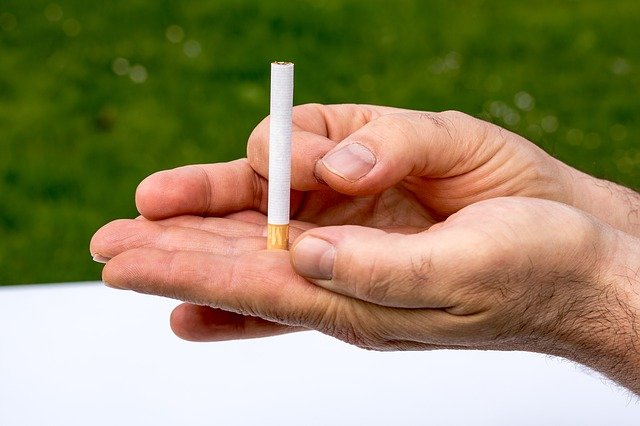
Smoking is bad for your health and well-being. The mortality rate for smokers is three times higher than that of non-smokers. The reason it’s so much higher, – cigarettes contain 600 ingredients, that when smoked generate 7,000 toxic chemicals with 69 of those linked to cancer.
The effects can be seen throughout the body with smoking causing and exacerbating serious health issues such as lung, oral, and cervical cancer, heart disease, high cholesterol, diabetes, and much more. This is all on top of the more visible issues, like stained fingers, persistent coughing, smelly hair, age spots, and poor oral hygiene.
The teeth and gums are also impacted by smoking. Yellow and brown stains on teeth are telltale signs of long-term smoking, and research shows that smokers are six times as likely to develop gum disease due to the increased bacteria and reduced saliva in the mouth which can lead to teeth becoming loose, falling out or requiring extraction.
But by quitting smoking, you can reverse the damage and improve your oral and overall health.
1) How smoking affects your looks and life?
Smoking can negatively affect your physical appearance and how you live your life.
● Damaged teeth and gums- According to the American Dental Association, smoking tobacco stains teeth and restorations and scan diminish your sense of taste. Eventually, smoking can block your immune system; this puts you at a higher risk of getting gum or periodontal disease. This can affect the tissue and other structures around the tooth and can result in tooth loss.
● Skin damage – Smoking damages skin in dramatic and sometimes irreversible ways. It deprives the skin of oxygen and nutrients, which can cause it to become loose. Smokers can also have the appearance of pale or uneven skin tone. Smoking can damage collagen and elastin in the skin – these are essential fibres that give skin its elasticity. Smokers are also more likely to experience sagging skin, deep wrinkles, and age spots especially if they are long-term or heavy smokers. Long-term smoking can make your fingers smell and turn them yellow. Once discoloured, this can take months after quitting to fade.
● Lines around the lips – Smokers develop a smoker’s pucker from using muscles around their lips much more than a non-smoker. This, combined with reduced elasticity of the skin, can lead to dynamic lines around the lips,
commonly known as smokers’ lines. These tiny vertical wrinkles form on the top of the upper lip and run upward toward the nose.
● Oral cancer- Smoking increases the risk of oral cancer; this can be aggressive because of the number of lymph nodes and blood vessels in your head and neck. 85% of oral cancer is linked to tobacco use; pipe smoking has
been primarily linked to this type of cancer. Second-hand smoke can also cause an increased risk of oral cancer.
● Lung cancer- Doctors have stated for years that smoking causes most cases of lung cancer. Today, 9 out of 10 lung cancers are caused by smoking. The poison in cigarette smoke weakens your immune system; this makes it harder to kill the cancer cells. This can cause cancer cells to continue growing and mutating even during treatment.
2) How quitting smoking helps your teeth?
Quitting smoking can improve your oral hygiene and dental health in numerous ways.
Smokers who quit smoking are less likely to lose their teeth prematurely than those who don’t kick the habit. Dental researcher’s at the University of Newcastle upon Tyne observed a group of 49 smokers with chronic gum disease for one year and found that one-fifth of those who were encouraged to stop smoking experienced a significant improvement in gum health over the 12 months compared to those who continued to smoke.
Quitting cigarette use can improve the appearance of stained teeth. Forty-eight hours after you quit smoking, your sense of smell and taste will improve significantly.
The nerve endings that were previously damaged by smoking will begin to regrow. Your breath will smell fresher, and your saliva production will increase, which can help to wash away food debris and reduce the number of bacteria in your mouth.
The pH balance of your mouth will be restored, so you are less likely to get tooth decay and experience dental erosion as long as you practise a good oral hygiene regimen.
Your mouth will respond better to treatment because smoking inhibits healing. You will become a suitable candidate for a dental implant since smokers typically have a higher risk of implant failure than non-smokers.
When you quit smoking you greatly reduce your risk of oral cancer. Developing oral cancer can be up to 50% less likely five years after you quit. Quitting will reduce your cancer risks significantly. Regular oral screenings are still important to identify any suspicious lumps or sores in the early stages.
3) How quitting improves your looks?
The adverse effects of smoking are there for all to see – and at times literally, with long-term smokers at increased chance of not just cancers and other major health risks but also premature ageing, bad skin, hair loss and poor oral hygiene. At best, this may just lead to discolouration of the teeth, but it can lead to gum disease, missing teeth, and sensitive teeth to the point of making eating painful.
By quitting smoking, you increase the blood and nutrient flow to the skin; it will look brighter and healthier, and you will regain a youthful glow. Wrinkles will look less noticeable as you won’t be using those muscles as much anymore.
Thankfully, stopping smoking can reverse the damage and the sooner you decide to quit, the better the results will be.
Author Bio:
Northway Dental Practice is a well equipped and reputable dental clinic headed by Dr. Andrew Crosby and Dr. Priyal Crosby, the highly experienced Maghull dentist near Ormskirk with special interest in cosmetic and conservative dentistry.